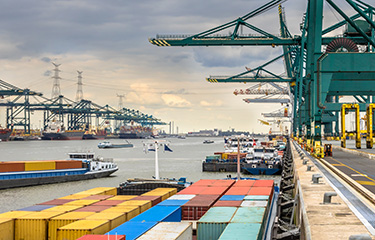UK port strikes, China’s Golden Week set to disrupt global shipping

There’s been a sharp drop in air and sea freight prices to and from China and Europe this year, while China has cut port fees in order to cushion exporters.
Rates for 40-foot containers from China to Western Europe are back to pre-pandemic levels, according to Gary Wilcox, the CEO of logistics firm JAG UFS Group, which has an office in Beijing. Shippers are now paying 25 percent of what they were shelling out at the peak of the pandemic, when the cost of sending a 40-foot container from China to Europe hit a high of USD 20,000 (EUR 20,700).
The weakening of major currencies against the dollar and the introduction of larger vessels by shipping firms have contributed to the drop, said Wilcox, who sees similar downward pressure beginning to hit air freight rates, which are now around USD 7.00 (EUR 6.72) per kilogram on flights from mainland China to Western Europe – a massive reduction from the USD 20.00 (EUR 19.20) per kilogram seen at the peak of pandemic inflation, Wilcox told SeafoodSource.
Also reducing costs for Chinese seafood traders is a move by China’s central government to cut road and port costs for exporters. In Q4 2022, the government will pay 10 percent of the cost of tolls on private highways for commercial trucks, and “government-designated” cargo port charges will be cut by 20 percent, according the country’s state council.
China’s economic growth has been harmed by strict “zero-COVID” measures that have resulted in lockdowns in dozens of cities, including Shanghai. It is possible China President Xi Jinping pushes to loosen some of the country’s COVID restrictions in November 2022, following a meeting of the Communist Party that’s expected to give Xi an unprecedented third term as leader, but Chen Long, a partner at Beijing-based consultancy Plenum, and Xinran Andy Chen, a senior analyst Shanghai-headquartered consultancy Trivium, told the Financial Times they don’t expect a lifting of the zero-COVID policy until 2023.
“Shifting away from the zero-COVID policy right after the party congress will look like [Xi] is not totally in charge, like he was forced to back away from one of his signature policies right after a leadership transition,” Xinran Chen said. “Letting it go will be a very gradual process.”
Meanwhile, Europe’s overstretched supply chains are experiencing disruptions as the U.K. ports of Felixstowe and Liverpool endure labor strikes as a result of dockworkers demanding better pay in response to soaring inflation, according to Container xChange.
The strikes will lead to port closures of up to more than a week. And the recent impact of Typhoon Muifa and Typhoon Hinnamor has led to port closures just ahead of the Golden Week in China. Taking place from 1 to 7 October, the Golden Week encompasses China National Day, and will result in most factories being shut across China and work stoppages in Chinese ports.
“These disruptions will delay the peak season cargo coming from China to Europe. The cargo ships will be diverted to other ports in Europe and the U.K., adding pressure to the congestion in the port of Bremerhaven, Hamburg, Rotterdam, and major port hubs where our proprietary data shows the container availability index is already at a very high level,” Container xChange Co-Founder and CEO Christian Roeloffs said.
Container availability levels have been rising since the last week of May across ports in Europe as container build-up, congestion increases, empty containers, and port closures due to low water levels caused by drought all contribute to a looming problem for European traders.
In a market update, Maersk said it was implementing cargo diversions to ports including Antwerp and Le Havre. Container xChange data shows the port of Le Havre with the highest congestion in its container availability index so far this year.
“These disruptions will only add to the difficulties in the Asia-Europe cargo movement at a time when the trade lane is traditionally extremely busy to fulfill holiday season orders,” a Container xChange customer who requested anonymity said.
Another impact will be the delay in expatriating empty containers from Europe back to China due to the closures and capacity issues, according to Roeloffs.
“Not just for the import of cargo for the coming peak season, I think right now the impact will be majorly on the hindrances of exporting empties out of Europe. Overstressed depots full of empty containers will face further inefficiencies because of the strikes as the operations will be halted,” Roeloffs said.
In August 2022, average container prices declined by 50 percent year-over-year due to a speed-up in container trading volumes in China beginning in July 2022. But with the arrival of peak shipping season, many Container xChange customers are fearful of the headwinds they may face.
“Golden Week … will add a lot of friction to container movement, because shipments will stop due to the strikes, the extreme weather conditions, and inflation in general,” an unnamed container trader said via the Container xChange platform. “We are expecting panic for holiday shipments.”
Separately, MSC Mediterranean Shipping Company has begun development of a new MSC Air Cargo solution “in response to customer demand and as a complementary service to its container shipping solutions.”
“MSC Air Cargo has been under development for several months and the new solution will be available from early 2023, following the delivery of the first of four MSC-branded Boeing 777-200F aircraft that will be operated by Atlas Air, a subsidiary of Atlas Air Worldwide Holdings,” it said. “MSC has appointed Jannie Davel, formerly of Delta Cargo, Emirates SkyCargo, and DHL to develop its air cargo business and to build the team that will implement it.”
Photo courtesy of Rudmer Zwerver/Shutterstock






Share